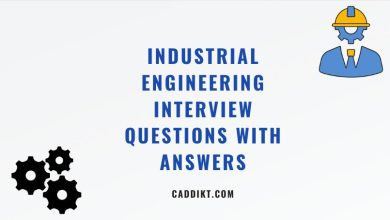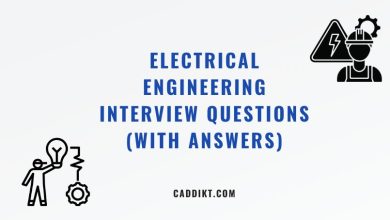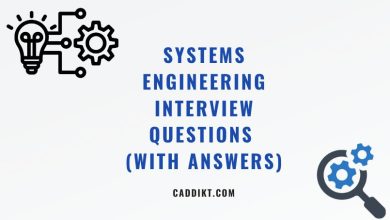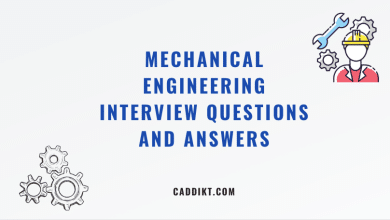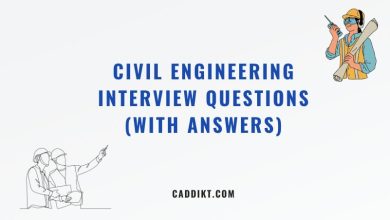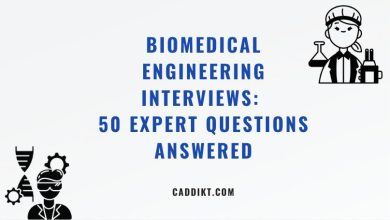Welcome to our comprehensive guide on chemical engineering interview questions and answers! If you’re preparing for a job interview in the field of chemical engineering, this article is tailored to help you succeed. We have compiled a list of 50 carefully selected questions that cover various aspects of chemical engineering, ranging from basic principles to advanced topics. Our goal is to equip you with the knowledge and insights necessary to confidently tackle any interview question that comes your way.
In the highly competitive field of chemical engineering, employers seek candidates who possess a strong foundation in the principles of chemical engineering, as well as the ability to apply that knowledge to practical scenarios. Through this article, we aim to provide you with not just the questions, but also concise and comprehensive answers that will help you showcase your expertise and problem-solving skills during the interview. Whether you’re a recent graduate or an experienced professional, our collection of interview questions will challenge you and expand your understanding of the field.
Remember, the key to success in an interview lies not only in knowing the answers but also in effectively communicating your thoughts and demonstrating your passion for chemical engineering. So, let’s dive into these 50 interview questions and empower you to stand out as a knowledgeable and confident candidate in your next chemical engineering interview.
Top 50 Chemical Engineering Interview Questions:
1. What is chemical engineering?
Chemical engineering is a branch of engineering that deals with the design, development, and operation of processes and equipment used in the production of chemicals, fuels, pharmaceuticals, and other materials.
2. What are the basic principles of chemical engineering?
The basic principles of chemical engineering include mass and energy balances, thermodynamics, fluid mechanics, heat transfer, reaction kinetics, and process control.
3. Explain the concept of mass and energy balance.
Mass and energy balance is a fundamental principle in chemical engineering. It involves accounting for the mass and energy entering and leaving a system or process to ensure that there is no accumulation of mass or energy within the system.
4. What is the role of a chemical engineer in process design?
A chemical engineer plays a crucial role in process design by developing the most efficient and cost-effective processes for the production of chemicals or other products. They consider factors such as raw material selection, reactor design, separation techniques, and process control.
5. Can you explain the difference between batch and continuous processes?
In a batch process, a finite amount of feed material is processed in a single batch, while in a continuous process, feed material is continuously added, and products are continuously removed without interrupting the process.
6. What are some common unit operations in chemical engineering?
Common unit operations in chemical engineering include distillation, filtration, heat exchange, evaporation, crystallization, mixing, and reaction.
7. What is a P&ID and why is it important?
A P&ID (Piping and Instrumentation Diagram) is a schematic representation of the process flow within a chemical plant. It shows the interconnections of equipment, piping, and instrumentation and provides essential information for process design, operation, and maintenance.
8. How do you control the temperature in a chemical process?
The temperature in a chemical process can be controlled by various methods such as adjusting the heat input or removal, manipulating the flow rate of heat transfer fluids, using temperature sensors and controllers, and implementing feedback control loops.
9. What are the safety considerations in chemical engineering?
Safety is of paramount importance in chemical engineering. It involves identifying and mitigating potential hazards, implementing proper ventilation systems, using appropriate protective equipment, following standard operating procedures, and ensuring compliance with regulatory guidelines.
10. Explain the concept of reactor design.
Reactor design involves designing the optimal type, size, and configuration of reactors for chemical reactions. It takes into account factors such as reaction kinetics, heat transfer, mass transfer, and desired product specifications.
11. What is the importance of process simulation in chemical engineering?
Process simulation allows chemical engineers to model and analyze the behavior of chemical processes before implementation. It helps in optimizing process parameters, identifying potential issues, estimating product yields, and evaluating the economic viability of the process.
12. How does mass transfer occur in chemical processes?
Mass transfer occurs in chemical processes through mechanisms such as diffusion, convection, and molecular migration. It involves the transport of components from one phase to another and is critical in operations like absorption, distillation, and extraction.
13. What are the different types of chemical reactors?
There are several types of chemical reactors, including batch reactors, continuous stirred-tank reactors (CSTR), plug-flow reactors (PFR), packed bed reactors, and fluidized bed reactors. Each type has its own advantages and is suitable for specific reaction conditions and objectives.
14. How is heat transfer achieved in chemical processes?
Heat transfer in chemical processes is achieved through methods such as conduction, convection, and radiation. It involves the transfer of thermal energy from a heat source to a heat sink or between different components within the process.
15. What is process control and why is it important in chemical engineering?
Process control refers to the techniques and strategies used to maintain desired process conditions and ensure optimal performance. It involves monitoring process variables, making adjustments as needed, and implementing control systems to enhance safety, efficiency, and product quality.
16. Can you explain the concept of reaction kinetics?
Reaction kinetics is the study of how chemical reactions occur and the factors that influence their rate. It involves understanding the reaction mechanism, determining rate equations, and investigating the effects of temperature, concentration, and catalysts on reaction rates.
17. What are some common separation techniques used in chemical engineering?
Common separation techniques in chemical engineering include distillation, extraction, filtration, crystallization, chromatography, and membrane separation. These techniques are employed to separate and purify different components or phases in a mixture.
18. How does fluid flow behavior impact chemical processes?
Fluid flow behavior has a significant impact on chemical processes. It affects parameters such as pressure drop, mixing efficiency, heat transfer rates, and reaction kinetics. Understanding fluid flow behavior is crucial for designing efficient and reliable process equipment and pipelines.
19. What are the environmental considerations in chemical engineering?
Environmental considerations in chemical engineering involve minimizing the environmental impact of chemical processes and products. This includes waste management, pollution prevention, energy conservation, sustainable resource utilization, and compliance with environmental regulations.
20. How do you optimize a chemical process?
Optimizing a chemical process involves improving its efficiency, productivity, and profitability. It requires analyzing process variables, identifying bottlenecks or inefficiencies, and implementing changes or modifications to maximize desired outcomes, such as yield, selectivity, and energy usage.
21. Explain the concept of process safety management.
Process safety management is a systematic approach to identify, evaluate, and control process hazards to prevent accidents and ensure the safety of personnel, equipment, and the surrounding environment. It involves risk assessment, emergency preparedness, safety training, and the implementation of safety protocols and procedures.
22. What are the challenges faced by chemical engineers in the industry?
Chemical engineers face various challenges in the industry, such as ensuring process safety, addressing environmental concerns, optimizing energy usage, managing complex reactions and separations, staying updated with technological advancements, and meeting regulatory requirements.
23. Can you explain the concept of process economics?
Process economics involves assessing the financial viability and profitability of a chemical process. It includes estimating capital and operating costs, analyzing cost factors such as raw materials, utilities, labor, and equipment, and evaluating the potential return on investment.
24. What is the role of a chemical engineer in sustainable development?
A chemical engineer plays a crucial role in promoting sustainable development by applying principles of green chemistry, energy efficiency, and waste reduction in the design and operation of chemical processes. They strive to minimize the environmental impact of chemical manufacturing by implementing cleaner production methods, optimizing resource utilization, and developing sustainable technologies. Chemical engineers also contribute to the development of renewable energy sources, such as biofuels and solar cells, and work towards creating sustainable solutions for water treatment, air pollution control, and waste management. Their expertise in process optimization and life cycle assessment helps in identifying opportunities for reducing energy consumption, greenhouse gas emissions, and overall environmental footprint of chemical processes.
25. How do you handle process safety incidents?
Handling process safety incidents involves a systematic approach that includes emergency response procedures, assessing the severity of the incident, implementing immediate measures to mitigate the impact, investigating the root cause, and implementing corrective actions to prevent recurrence.
26. What are some emerging trends in chemical engineering?
Some emerging trends in chemical engineering include the development of renewable energy technologies, advancements in nanotechnology and materials science, process intensification, sustainable process design, and the integration of artificial intelligence and data analytics in process optimization.
27. Can you explain the concept of process scale-up?
Process scale-up involves taking a laboratory or pilot-scale process and successfully replicating it at a larger production scale. It requires considering factors such as equipment sizing, mass and heat transfer characteristics, safety considerations, and economic feasibility.
28. How do you ensure product quality in chemical manufacturing?
Ensuring product quality in chemical manufacturing involves implementing quality control measures, such as rigorous testing and analysis at various stages of the production process. This includes monitoring raw materials, intermediate products, and final products to meet specified quality standards.
29. Can you explain the concept of process validation?
Process validation is the process of establishing documented evidence that a process consistently produces a product meeting predetermined quality requirements. It involves conducting validation studies, establishing process parameters, and ensuring that the process remains in a state of control.
30. How do you stay updated with the latest advancements in chemical engineering?
To stay updated with the latest advancements in chemical engineering, professionals often participate in conferences, seminars, and workshops. They also engage in continuous learning through reading scientific journals, collaborating with colleagues, and actively seeking new knowledge through online resources and professional networks.
31. What are the key skills required for a chemical engineer?
Key skills for a chemical engineer include strong analytical and problem-solving abilities, knowledge of process design and optimization, proficiency in using engineering software, excellent communication and teamwork skills, and a strong understanding of safety and environmental regulations.
32. Can you explain the concept of process integration?
Process integration involves optimizing the overall energy and material flows within a chemical plant or industrial complex. It aims to minimize energy consumption, reduce waste generation, and improve process efficiency by integrating different unit operations and utilizing waste streams as feedstock.
33. How do you approach troubleshooting in a chemical process?
When troubleshooting a chemical process, it is important to systematically identify the root cause of the issue. This involves analyzing process data, conducting equipment inspections, considering possible process deviations, and applying problem-solving techniques to rectify the problem and restore normal operation.
34. What are the considerations for selecting materials of construction in chemical processes?
When selecting materials of construction in chemical processes, considerations include chemical compatibility, mechanical strength, corrosion resistance, thermal stability, cost, and regulatory requirements. Materials such as stainless steel, alloys, polymers, and ceramics may be chosen based on the specific process conditions.
35. Can you explain the concept of heat exchangers?
Heat exchangers are devices used to transfer heat from one fluid to another without the fluids mixing. They consist of a series of tubes or plates that allow heat transfer between the fluids while maintaining a physical separation. Heat exchangers are widely used in various chemical processes for efficient heat transfer.
36. How do you ensure
To ensure process reliability and robustness in chemical engineering, several measures can be taken:
- Thorough Process Design: A well-designed process takes into account potential sources of variability, considers safety margins, and incorporates redundancy or backup systems where necessary.
- Process Monitoring: Implementing advanced process monitoring techniques, such as real-time sensors and data analytics, allows for early detection of deviations and prompt corrective actions.
- Effective Maintenance Strategies: Establishing routine maintenance schedules, conducting inspections, and addressing equipment issues promptly can prevent unexpected failures and ensure optimal performance.
- Quality Control: Implementing robust quality control procedures throughout the process ensures that specifications are met consistently and deviations are identified and rectified promptly.
- Employee Training and Engagement: Providing comprehensive training to operators and personnel involved in the process increases their awareness of potential risks and equips them with the necessary skills to respond effectively to deviations or abnormal situations.
- Risk Assessment: Conducting regular risk assessments to identify potential hazards and implementing appropriate risk mitigation measures helps reduce the likelihood of incidents and enhances process reliability.
- Continuous Improvement: Encouraging a culture of continuous improvement allows for the identification of opportunities for optimization and the implementation of measures to enhance the reliability and robustness of the process.
37. Can you explain the concept of process safety culture?
Process safety culture refers to the collective attitudes, values, and behaviors within an organization that prioritize and promote safety in all aspects of process design, operation, and maintenance. It involves fostering a safety-conscious work environment, encouraging open communication about safety concerns, and ensuring that safety is integrated into all levels of decision-making.
38. What are the key considerations in process equipment selection?
Key considerations in process equipment selection include the required capacity, operating conditions (temperature, pressure, etc.), compatibility with process fluids, material of construction, reliability, maintenance requirements, and cost-effectiveness. Additionally, factors such as safety, environmental impact, and regulatory compliance also play a significant role in equipment selection.
39. Can you explain the concept of process intensification?
Process intensification involves designing and developing innovative methods to enhance the efficiency and effectiveness of chemical processes. It aims to achieve higher productivity, reduced energy consumption, smaller equipment footprint, and improved process performance by integrating multiple operations, optimizing process conditions, and utilizing novel technologies.
40. How do you ensure process reliability and robustness in chemical engineering?
Ensuring process reliability and robustness involves designing and implementing systems and procedures that minimize the likelihood of process failures and enable the process to withstand disturbances. This includes conducting thorough risk assessments, implementing redundancy or backup systems, using reliable instrumentation and control systems, and incorporating appropriate safety margins.
41. Can you explain the concept of total quality management (TQM) in chemical engineering?
Total quality management (TQM) in chemical engineering is an approach that focuses on continuous improvement, customer satisfaction, and the elimination of waste and defects. It involves implementing quality management systems, engaging employees in quality improvement initiatives, using statistical process control techniques, and fostering a culture of excellence.
42. What are the key considerations in plant layout design for chemical processes?
Key considerations in plant layout design for chemical processes include efficient material flow, minimizing cross-contamination risks, ensuring safety and regulatory compliance, optimizing space utilization, facilitating maintenance and accessibility, and considering future expansion or modifications. It also involves proper placement of equipment, utilities, storage areas, and personnel facilities.
43. Can you explain the concept of process automation in chemical engineering?
Process automation in chemical engineering involves the use of control systems, instrumentation, and advanced technologies to automate and optimize process operations. It aims to improve process efficiency, reduce human errors, enhance safety, and enable real-time monitoring and control of process variables.
44. What are the considerations for selecting a reactor type for a specific chemical reaction?
When selecting a reactor type for a specific chemical reaction, considerations include reaction kinetics, reaction mechanism, reactant and product properties, desired conversion and selectivity, safety requirements, heat transfer considerations, and scalability. Different reactor types offer varying advantages and limitations, and the choice depends on the specific reaction requirements.
45. Can you explain the concept of process hazard analysis?
Process hazard analysis is a systematic evaluation of potential hazards associated with a chemical process. It involves identifying and assessing possible scenarios that could lead to accidents or process deviations, analyzing their consequences, and implementing preventive or mitigating measures to reduce the risks. Techniques such as HAZOP (Hazard and Operability Study), FMEA (Failure Mode and Effects Analysis), and What-If Analysis are commonly used for process hazard analysis.
46. What are the key considerations in plant layout design for chemical processes?
In plant layout design for chemical processes, key considerations include efficient material flow, minimizing cross-contamination risks, ensuring safety and regulatory compliance, optimizing space utilization, facilitating maintenance and accessibility, and considering future expansion or modifications. Proper placement of equipment, utilities, storage areas, and personnel facilities is also important for enhancing productivity and operational efficiency within the chemical plant.
47. Can you explain the concept of process optimization in chemical engineering?
Process optimization in chemical engineering involves maximizing process efficiency, productivity, and profitability. It includes identifying and quantifying process variables, utilizing mathematical models and simulations, conducting experiments or data analysis, and implementing changes or adjustments to optimize the process parameters and achieve the desired outcomes.
48. What are the challenges in scaling up a chemical process from lab to industrial production?
Scaling up a chemical process from laboratory-scale to industrial production can present various challenges. These include ensuring consistent product quality, addressing safety and environmental concerns at a larger scale, dealing with equipment and operational complexities, managing higher production volumes, and optimizing cost and resource utilization.
49. Can you explain the concept of process analytical technology (PAT) in chemical engineering?
Process analytical technology (PAT) in chemical engineering involves the application of advanced analytical tools and techniques for real-time monitoring and control of key process variables. It enables continuous analysis of process parameters, rapid feedback control, and data-driven decision-making to enhance process efficiency, product quality, and process understanding.
50. What are the current trends and future prospects in the field of chemical engineering?
Current trends in the field of chemical engineering include the development of sustainable and green processes, advancements in biotechnology and bioengineering, integration of digital technologies and automation, exploration of new materials and nanotechnology applications, and the increasing emphasis on circular economy and waste reduction. Future prospects involve further integration of AI and machine learning, advancements in energy storage technologies, and innovations in chemical process design and optimization.
Conclusion
Congratulations! You have completed our in-depth exploration of 50 chemical engineering interview questions and answers. We hope this comprehensive guide has provided you with valuable insights and enhanced your preparation for your upcoming interview. By familiarizing yourself with the diverse range of questions, from basic concepts to advanced topics, you are now better equipped to showcase your expertise and problem-solving skills to potential employers.
Remember, the key to success in a chemical engineering interview is not solely dependent on knowing the answers. It’s equally important to effectively communicate your thoughts, demonstrate your ability to think critically, and showcase your passion for the field. Use the knowledge gained from this guide to articulate your ideas concisely and confidently.
As you move forward in your journey towards a successful career in chemical engineering, we encourage you to continue expanding your knowledge, staying updated with the latest advancements, and honing your problem-solving abilities. With dedication, perseverance, and a solid understanding of the principles of chemical engineering, you can confidently tackle any interview and excel in your professional endeavors. Best of luck in your future interviews and your promising career in chemical engineering!

